Torque Vectoring Market Insights: 2031
The global torque vectoring market size was valued at $8.1 billion in 2021, and is projected to reach $31.8 billion by 2031, growing at a CAGR of 15.2% from 2022 to 2031.
A torque vectoring is a computer-controlled system that controls torque between the wheels. The market is likely to propel during the forecast period owing to rise in sales of electric vehicles globally. According to a report released by The International Council on Clean Transportation, Global EV sales reached a record-high of 6.9 million in 2021, a 107% increase from 2020.
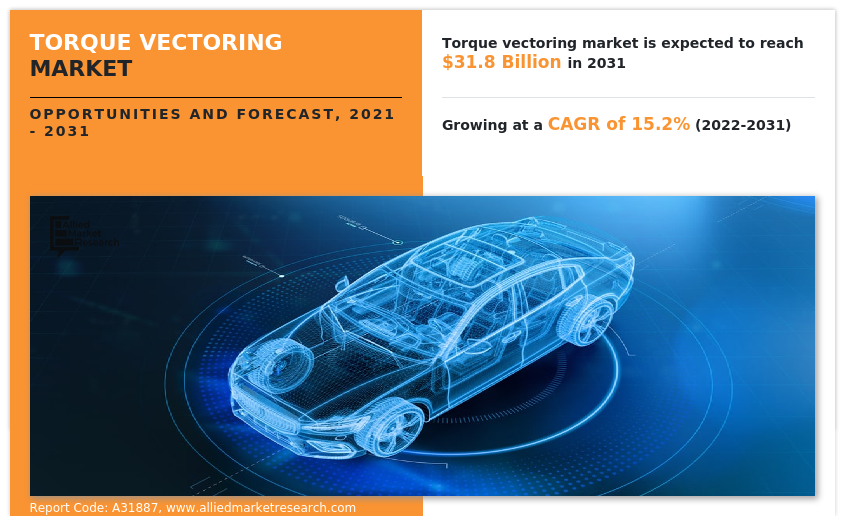
It was the first time since 2012 that the global EV sales doubled in one year. Of the vehicles sold, 98% were light-duty vehicles (LDVs) and 2% were heavy-duty vehicles (HDVs). By the end of 2021, cumulative global sales of EVs reached 18.6 million, a 58% increase from end of 2020. Of these vehicles, 95% were LDVs while HDVs accounted for 5%. In 2021, the global average EV share of new vehicle sales achieved an all-time high of 8.3%, up from 4.2% in 2020. This is a major factor responsible for boosting the global torque vectoring market size.
Further, rise in use of commercial and passenger vehicles across industries mainly logistics & transportation is propelling torque vectoring market size. As per secondary sources, light duty electric vehicle sales at global level reached around 6.3 million units in 2021. These are some of the factors driving the market growth.
One of the major factors driving the growth of the torque vectoring market is the stringent regulatory and government alliances to lower carbon emission at global level. Governments are formulating various initiatives and programs to boost sustainability and achieve clean green energy. Various concessions and subsidies are given at industrial level to replace fuel-based cars with electric or hybrid vehicles. Moreover, various sanctions are given by regulatory bodies to create EV infrastructure and other essential support to promote clean and green energy. This is likely to fuel the market during the forecast period.
However, the high costs involved in integrating torque vectoring solutions in vehicles have increased the total cost of the vehicles. In addition, shortage of essential components to integrate in controlling and braking systems is hampering the market growth. This shortage is mainly due to outbreak of COVID-19 impact, which created supply chain complexities, and unexpected war between Russia and Ukraine. This unprecedented situation created volatility in import/export trade activities, further slowing down the car torque vectoring market.
The key players profiled in the torque vectoring market report include GKN, American Axle, Dana, BorgWarner, Eaton, ZF, JTEKT, Getrag, Bosch, Univance, Schaffler, Timken, Richardo, and Oerlikon Graziano.
The torque vectoring market is segmented on the basis of vehicle type, propulsion, technology, clutch actuation type, and region. By vehicle type, the market is classified into passenger car, light commercial vehicles, and heavy commercial vehicles. On the basis of propulsion, the market is categorized into front wheel drive (FWD), rear wheel drive (RWD), and all-wheel drive/four wheel drive (AWD/4WD). By technology, the market is bifurcated into active torque vectoring system and passive torque vectoring system. By clutch actuation type, the market is divided into hydraulic clutch and electronic clutch. On the basis of region, the market is analyzed across North America, Europe, Asia-Pacific, and LAMEA. The torque vectoring market is segmented into Vehicle Type, Propulsion, Technology and Clutch Actuation Type.
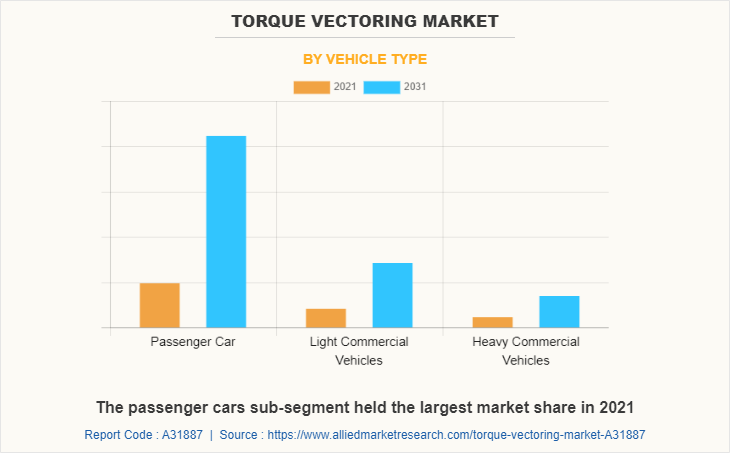
By vehicle type, the passenger car segment accounted for the largest torque vectoring market share in 2021 and is anticipated to be the fastest growing during the forecast period. Rise in sales of EV passenger vehicles, surge in disposable income of consumer, rapid urbanization, and globalization are some of the crucial factors that are fueling this segment. Moreover, increase in migration of people from developing to developed nations is creating a potential room for passenger car penetration. Hence, these are expected to be the major factors affecting the market size during the forecast period.
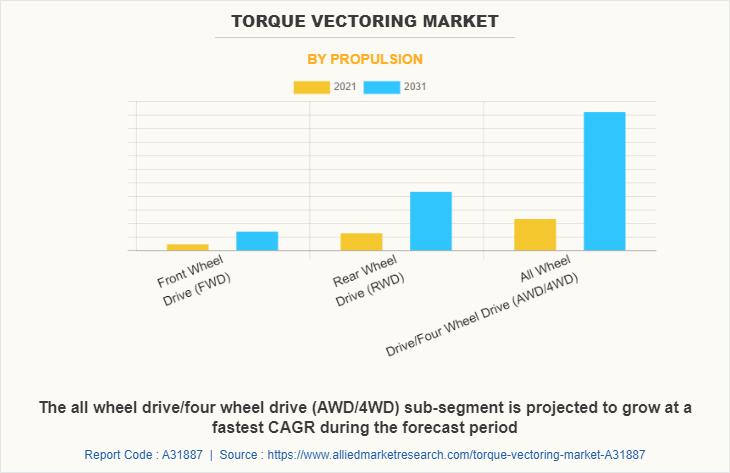
By propulsion, the all-wheel drive/four wheel drive (AWD/4WD) segment dominated the global Torque Vectoring market in 2021 and is expected to be the fastest growing segment during the forecast period. The growth of this segment can be attributed to the rapid technological innovation in AWD/4WD vehicles. Moreover, massive investments by foreign direct investors in automobile industry to improve driveline and other controlling & braking technology to develop advanced vehicles are favoring the growth of this segment. Moreover, major torque vectoring OEMs and other suppliers are proactively focusing on investing in developing these types of vehicles, further supplementing market growth.
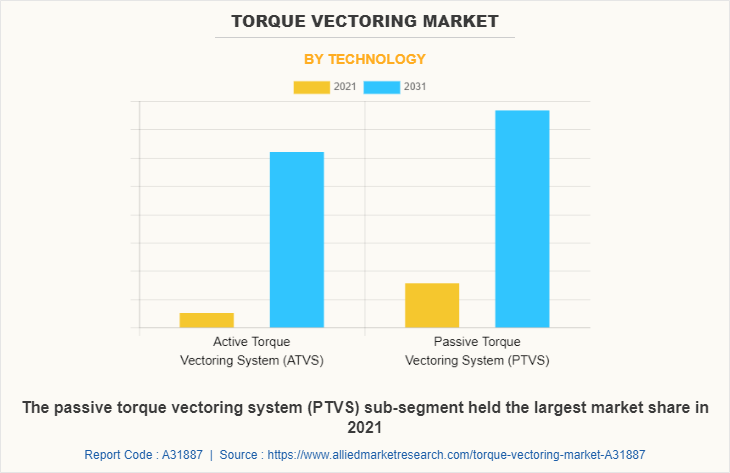
By technology, the passive torque vectoring system segment dominated the global Torque Vectoring market in 2021 and active torque vectoring system is anticipated to be the fastest growing segment during the forecast period. Passive torque vectoring system redirect the force efficiently, thereby improving traction and stability. Moreover, there are no additional parts required for the functioning in this type, which significantly reduces the weight in the vehicle.
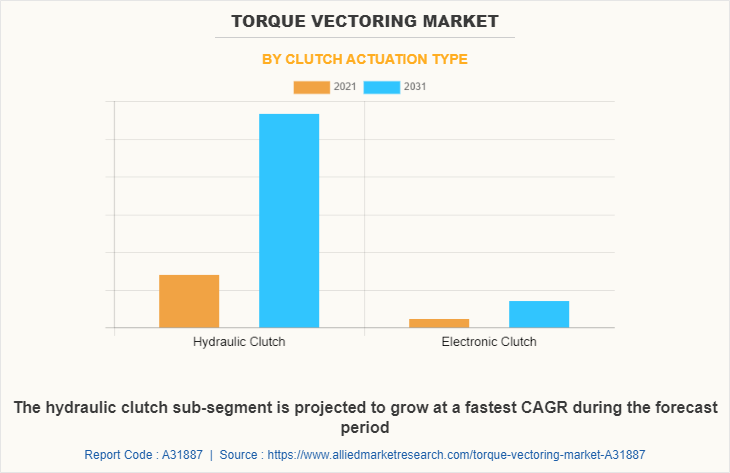
By clutch actuation type, the hydraulic segment accounted to show a dominant market share in 2021. Hydraulic clutch are operated through less effort that is required to press the clutch pedal. To transmit the pedal movement, a hydraulic clutch mechanism is ideal for passenger and commercial vehicles. Further, major technological developments are observed in this type to improve its quality, life span to achieve efficiency, and smoothness while driving. Moreover, there is least cost required for lubricating this type of clutch.
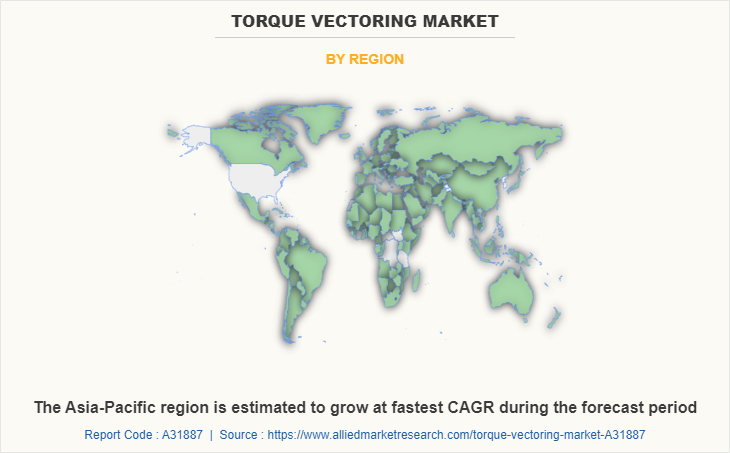
By region, North America dominated the global market in 2021 and Asia Pacific is projected to remain the fastest-growing segment during the forecast period. The presence of major manufacturers operating in torque vectoring market are having significant presence in North America. Further, rise in disposable income of consumers, rapid urbanization, surge in spending capacity of individuals, and massive investments by U.S governmental bodies to create a sustainable and clean environment is supplementing to the growth in this region. Apart from this, rapid technological innovations for building advanced torque vectoring system are boosting market growth. In addition to this, introduction and implementation of commercializing autonomous vehicles in North America is altogether proving to be a potential factor for fueling the global market.
Impact of COVID-19 on the Global Torque Vectoring Industry
The COVID-19 outbreak had a short-term impact on the torque vectoring market. Unavailability of raw materials & essential components, blockage of funds from foreign institutions, nationwide lockdown, travel restrictions, unavailability of skilled and other factors.
Further, there was a significant pressure observed in automobile industry due to disruption in supply chain. This complexity has further affected the prices of cars, volatility in exchange rates, and stock piling, resulting in slowing down the automotive industry, further affecting the global economy.
Key Benefits For Stakeholders
- This report provides a quantitative analysis of the market segments, current trends, estimations, and dynamics of the torque vectoring market analysis from 2021 to 2031 to identify the prevailing torque vectoring market opportunities.
- The market research is offered along with information related to key drivers, restraints, and opportunities.
- Porter's five forces analysis highlights the potency of buyers and suppliers to enable stakeholders make profit-oriented business decisions and strengthen their supplier-buyer network.
- In-depth analysis of the torque vectoring market segmentation assists to determine the prevailing market opportunities.
- Major countries in each region are mapped according to their revenue contribution to the global market.
- Market player positioning facilitates benchmarking and provides a clear understanding of the present position of the market players.
- The report includes the analysis of the regional as well as global torque vectoring market trends, key players, market segments, application areas, and market growth strategies.
Torque Vectoring Market Report Highlights
| Aspects | Details |
| Market Size By 2031 | USD 31.8 billion |
| Growth Rate | CAGR of 15.2% |
| Forecast period | 2021 - 2031 |
| Report Pages | 280 |
| By Clutch Actuation Type |
|
| By Vehicle Type |
|
| By Propulsion |
|
| By Technology |
|
| By Region |
|
| Key Market Players | Eaton Corporation, BorgWarner, ZF Friedrichshafen AG, jtekt corporation, Continental AG, Dana Incorporated, American Axle & Manufacturing, Inc., GKN Automotive Limited, univance corporation, Bosch Ltd |
Analyst Review
Torque vectoring technology has gained popularity over the past decade owing to rise in sales of commercial vehicles globally. Further, rapid technological innovation, surge in use of electric vehicles, increase in number of car accidents are some of the major factors that are likely to supplement the global torque vectoring market size. Its ability to electronically manage power to be sent to the wheels, which still have grip, dramatically improves car’s ability to speed up on slippery roads or accelerate out of tight corners. Introduction of such technology improves driver comfort experience and assures safety while driving. In addition, emergence of autonomous vehicles has propelled the demand for torque vectoring rapidly. These types of vehicles are configured with advanced emergency braking systems to control and prevent from swerving and skidding, which further boost the torque vectoring market. Moreover, the major manufacturers operating in this area are extensively focusing on innovating the torque vectoring technology with advanced features to stay competitive in the global market. However, high cost involved in integrating these technological solutions increase the vehicles prices, creating a potential factor for limiting market growth.
Among the analyzed regions, North America is expected to account for the highest revenue in the market during the forecast period. This can be owed to the presence of major market players having a significant presence in this region and massive investments in R&D activities to develop technologically advanced solutions.
Rise in number of electric vehicles globally, increase in R&D activities for innovating torque vectoring technology, and surge in number of car accidents are some of the key factors driving the growth of the market. Introduction of autonomous vehicles is creating lucrative business opportunities for the market growth.
The major growth strategies adopted by torque vectoring market players are technological advancements and mergers & acquisitions.
Asia-Pacific is expected to provide more business opportunities for the global torque vectoring market in future.
GKN, Dana, BorgWarner, and ZF are the major players in the torque vectoring market.
The all-wheel drive/four wheel drive segment acquired the maximum share of the global torque vectoring market in 2021.
The report provides an extensive qualitative and quantitative analysis of the current trends and future estimations of the global torque vectoring market from 2021 to 2031 to determine the prevailing opportunities.
Loading Table Of Content...



